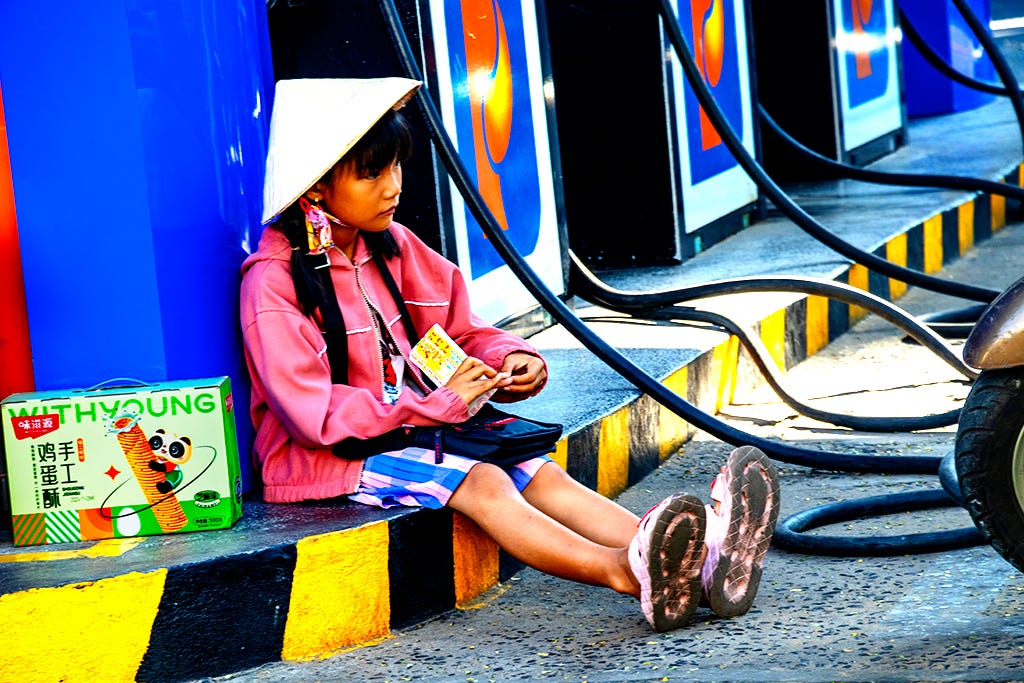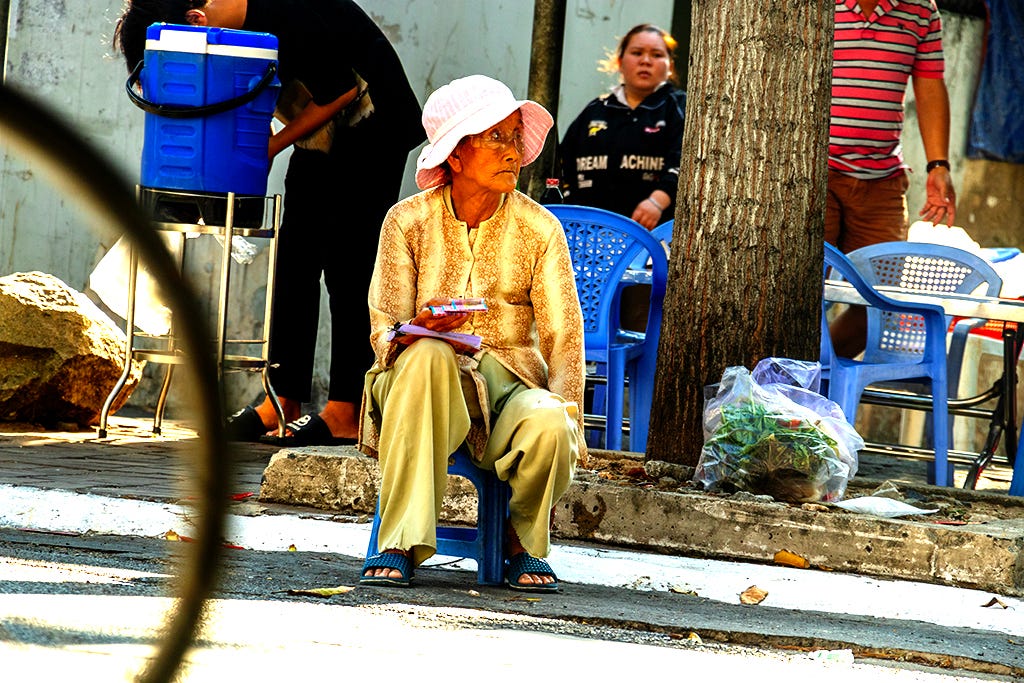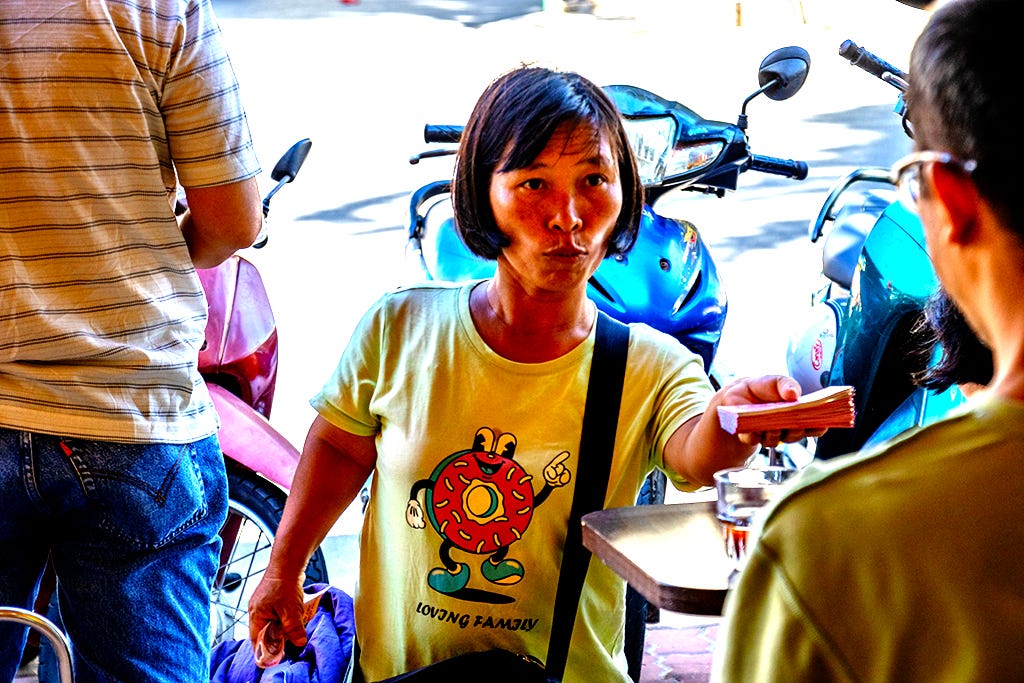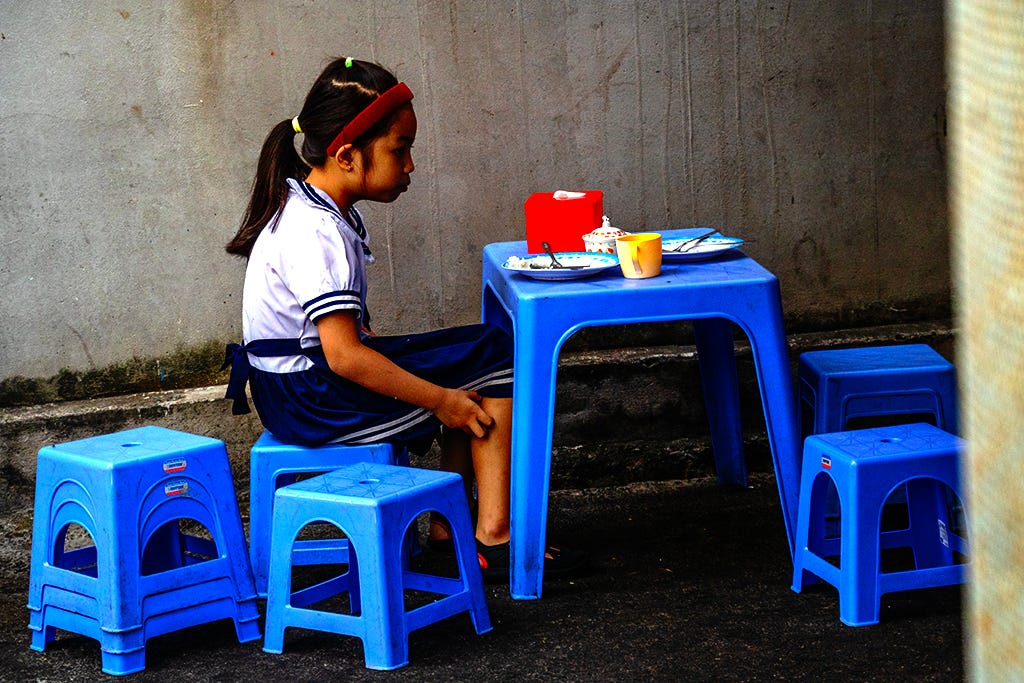Café on General Uprising
[Vung Tau, 2/1/24]
5:25AM and I am, again, at the café on Đồng Khởi. There’s singing from the TV behind me, but it’s not too loud. Right in front of me is that old man with a cane who hobbles around to sell lottery tickets. He’s masked but with his nose sticking out. Resting, he stares up at the half lit awning. Across the street, the laptop dealer is opening up. I bought a mouse from him for just over five bucks.
There’s constant laughter. Whereas online emoting often triggers snarkiness or anger, face to face conversations routinely induce mirth. There’s a dozen people here, all over 50. With bodies winding or breaking down, talks often veer towards health.
Chubby woman, “As long as your arms don’t hurt, you can still work.”
Thin woman, “But if your legs are sore…”
“Sitting down, you can still work.”
Like the hobbling man, the chubby woman peddles lottery tickets. They’re showing up in alarming number across Vung Tau. At a gas station three days ago, I saw a dejected girl no older than seven with her stack of red, yellow, blue and green shiny pieces of paper. Each has six magical digits you might have seen in a dream, which must mean you’ll be rich by sundown.
Before Tet, thousands of factory workers were laid off. That’s like getting fired just before Christmas. Overworked and homesick, these poor souls were looking forward to their Tet bonus so they could hop a bus for that yearly visit to their distant village. Now wageless, they had to abandon their cramped, cell-like home. Unable to pay bank loans, landlords also went under.
Enjoying each other’s company, most Vietnamese still joke and laugh, but that’s just their resilience. Yesterday, yet another lottery ticket seller said she had turned down a job taking care of some half dead invalid.
“It’s awful. I’d rather do this.”
“I agree. If lucky, you get a clean one, but many are so dirty, and stubborn. Some even fight back, so what are you going to do? You can’t beat them!”
Speaking of old people excreting, the second lady used “tiểu tiện,” a preposterous euphemism for urinating. It can be translated as “small convenience.” Much more terrifyingly, “đại tiện” or “large convenience” means shitting. Not so bad, though disgusting enough, is “trung tiện” or “middle convenience” to mean, you guess it, breaking wind. Just say fart, asshole!
Many Buddhist temples run old folks’ homes or orphanages. In an adjacent city, Ba Ria, there’s a youngish monk who tells funny stories to heal, he thinks, at least a hundred old women under his care. It sounds rather outlandish until you realize most stories are amusing.
I’ve moved to another cafe with a better table for writing. Walking here, I passed elementary school kids eating fried rice, fried noodles, spaghetti, macaroni or even “hamburger” for breakfast. The last I place in quotation marks because what you’ll get won’t resemble anything found at a respectable diner, Five Guys or just White Castle. What do you expect, though, for 61 cents? Such a small price still taxes struggling parents, but it’s almost cruel to deny your kids this pre-class ritual. Vietnamese love to eat out.
That great chronicler of Saigon life, Vương Hồng Sển (1902-1996), said that as a child, he couldn’t afford baguette with chicken curry, but only bread dipped into curry sauce. From 1975 to 1995, many Viets had to eat rice fried with just MSG or mixed with lard. Of course, reeducation camp inmates were lucky to stuff into their mouth anything with legs.
At 7:47AM, it’s 80 degrees and breezy. Having finished one lemonade without sugar, I might order another. At the next table, two men are talking about eating snakes. They’re too bony, so no good as fun food with booze, but as bits of protein in rice gruel, they’re acceptable. I’m no fan of minced watersnakes or watersnake patties. Eels, though, are delicious.
The barista here is fat and always wears fluffy Minnie Mouse ears. How long did it take for her to decide it’s her identity? Sleepless in bed, she could no longer escape the revelation her cuteness was best highlighted with Minnie Mouse ears. Nearing 30, she may never find a husband. Married men in their 40’s and 50’s often banter with her.
I heard one say, “We’re worn out, but you’re still blooming!”
Since “nở” means both bloom and balloon, it’s a playful dig at her girth. Quaking, she cracked up, her lovely face blooming.
This morning, I woke with a slight headache, but persisted on writing this, so now it’s almost done. With a good conscience, I can now crawl or slither home. As I pay the barista, she asks, “Are you a journalist, uncle?”
“No, an author, but in the US. I published books. I’ll tell you more on another occasion.”
“Where are you based, uncle?”
“I left the US, ah, nearly six years ago. I drift here and there. I’d like to live in Vung Tau, but every three months, I must leave.”
As she frowns sympathetically, I continue, “Next month, I must leave, then fly back in, to get three more months. If I take the bus, I’ll only get one month! It’s very stupid, the law. I’m very worn out.”
“But you look so healthy! I see you walk all over town! How old are you, uncle?”
“I’m only 60, but I look 80. I’m not healthy. Although you’re young, you must also pay attention to your health. Don’t wait until it’s too late!”
Catching myself talking like her dad, I must be careful, also, to not imply she already looks unhealthy. On her pink shirt, Bugs Bunny swells and sometimes heaves.
Such seemingly inconsequential exchanges still nourish. We feed each other.
In this cafe lives that jawless toy dog. Normally, she could be seen running around or resting, rather regally, on a chair. Today, she remains in her cage. Tired or just pensive, she has decided to shut out us annoying humans, at least for a few hours. Who can blame her, the adorable bitch?
[Vung Tau, 2/17/24]
[Vung Tau, 2/17/24]
[Vung Tau, 2/14/24]
[Vung Tau, 2/19/24]






I assume that the first picture below is the 7 y/o selling lottery tickets? It is sad to see someone so young already shackled to a task in order to help her family get by.
There is a lot of truth to your observation that "online emoting often triggers snarkiness or anger, but face to face conversations routinely induce mirth." Body language, hand movements, facial expression, tone of voice, even the emphasis placed on words and the hesitations introduced into speech all communicate in a way that is impossible to duplicate on-line. And that is why the "virtual life" the elites want us to embrace will never adequately replace the old-fashioned manner of human relations.
I think there is some truth to the Buddhist monk’s belief in the power of funny stories to heal. Positivity is important not just for yourself, but for those around you. I spent the last decade of my working life as a supervisor, but only after retirement did I realize that one of a leader’s most important but difficult duties is exuding positivity even when he feels like complaining. My occasional inability to pull this off is what made me only a middling supervisor. Negativity is infectious, and after all, complaining is at its root a confession of one’s powerlessness.
The rising number of lottery ticket sellers is certainly one indicator of the state of public prosperity or the lack of it. Here I see the rising number of lottery ticket BUYERS similarly, and it is also instructive to see who they are.
Not long ago, we drove past a rather rumpled woman of indeterminate age panhandling in the median of a freeway on/off-ramp, with the now-increasingly-common “anything helps” cardboard sign. To me it did not seem like a very good place for accepting handouts, since only one car will stop nearby, and only if the light is red. Better to stand next to a stop sign, where every car has to stop. In our case, the light was green when we arrived at the intersection, and stopping wasn’t an option since it would back up traffic exiting the freeway behind us.
We went on to our errand in the nearby grocery store, and sometime later, on our way out, we passed the lottery ticket vending machine. Lo and behold, standing in front of it, pulling crumpled dollar bills out of her pocket and buying lottery tickets, was the same woman we had seen on the freeway off-ramp. The first impulse of someone who had given her something might be anger or irritation. But then perhaps one is forced to recognize that the despair of many has reached the point that they believe a lucky “lightning strike” is their only hope of salvation.
It's depressing to see on the pink jacketed little girl's face. A seven year old is meant to wear a permanent smile, not an expression of trepidation made all the more heart wrenching by seeing her fingers intertwined in unconscious supplication.
Care giving of senile or crippled old Europeans and Americans is a booming industry - offering employment in the first world to those from the third world. I know several people, some of whom are as old as 80, taking care of elderly cripples who are sometimes younger than they are. The care givers are often Europeans from in-between countries like South Africa which is testament to that country's collapsing currency (and infrastructure).
Decrepit old age seems far removed at the moment, but it's astonishing how quickly it'll creep up. Cast your mind back 20 years - it seems like yesterday. But looking forward 20 years seems like an age. It won't be - it'll pass even more quickly than the last 20 years did (a phenomenon caused by a year becoming an ever decreasing proportion of our life as we age).
We all need to plan for our dotage but most never do. There are a few options: 1) stay fit and healthy enough to look after yourself until you die, 2) have sufficient money to pay someone to look after you as you become frail, 3) take yourself off into the countryside at a time of your choosing, lie down and wait until thirst sends you off.
I've been very familiar with 90+ year olds who've stayed fit and healthy and known a couple of people who've taken the third option. However most have taken the second route - looked after either by family, frail care or a helper in a third world country they've moved to. The sad fact of modern life is that, with so few modern couples having children, the surviving partner is unlikely to have family to turn to and will spend their final years in the company of strangers.